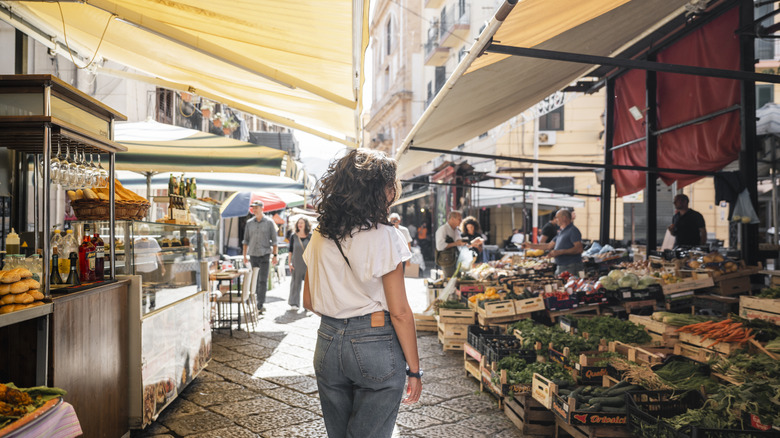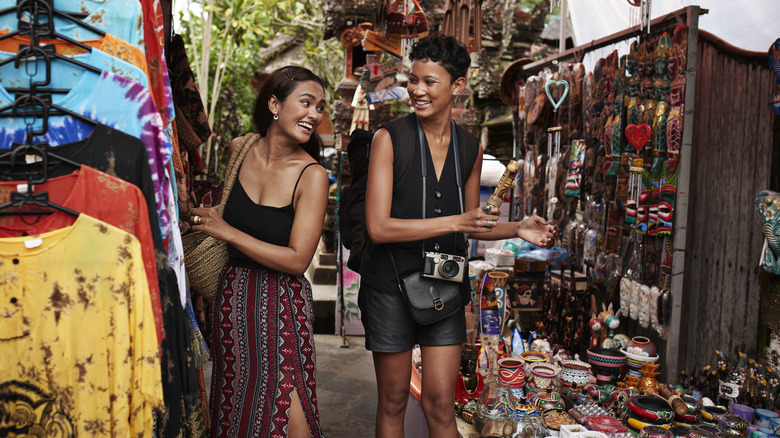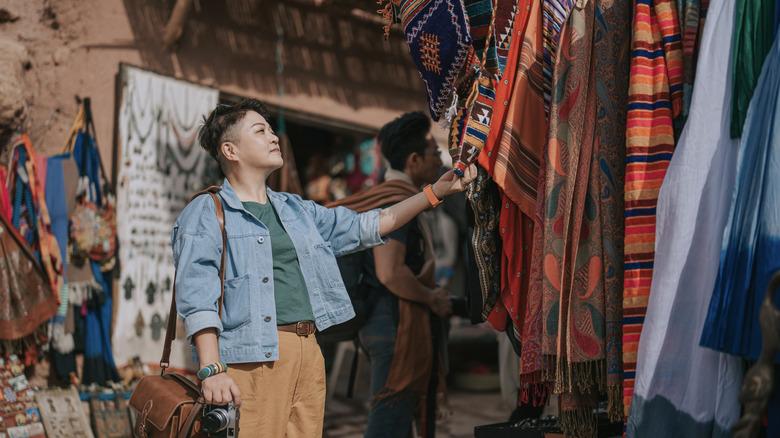Rick Steves' Smart Bargaining Strategies Can Help You Stretch Your Budget While Traveling
While travel expert Rick Steves is chock-full of genius money-saving tips when it comes to stretching your travel budget (such as going for a picnic, staying in a budget hotel, or drinking coffee at the counter), this one is for the introverted, not incredibly vocal traveler. If there's one thing many have a difficult time with, it's how to haggle for a good bargain. If you're like me, you probably hear a price, attempt in your smallest voice to suggest a lower one, hear "no", and go, "Okay, sounds good." Well, fear not, non-intrepid travelers, for by the time you finish reading today's article, you'll be a pro in the art of getting the price you want.
In some parts of the world, bargaining is practically considered an Olympic sport. In Steves' piece "How to Haggle: Tips for Bargaining Overseas," he states that "In some parts of the Mediterranean world (and majorly throughout places like Egypt, Morocco, and Turkey, the price tag is only an excuse to argue. Bargaining is the accepted and expected method of finding a compromise between the wishful thinking of the merchant and the tourist."
Steves doesn't just view haggling as a money-saving tactic. To him, it's an immersive, local experience — a shared tradition that reveals a culture's rhythm and personality. It's not about confrontation or cheapness. It's about engagement, observation, and respect. There are a few tips and tricks for not only ensuring you get the best deal for your money, but also the most appropriate time to go about it. Luckily, Steves (and I) are here to share tips and tricks so you can haggle your way through Europe.
Bargain in the right environment!
Before diving into your first round of haggling, it's essential to understand where it's considered culturally appropriate. While it's acceptable to bargain your way to a lower price in a flea market, going up to the grocery store clerk and asking them to lower the price of an apple probably won't get you a pleasant response. But step into the right environment, and it's not only acceptable, it's expected. Look around to see whether or not prices are fixed.
Steves suggests showing interest in purchasing an item, but then stating, "It's just too much money." According to him, once you've done this, "You've put the merchants in a position to make the first offer. If they come down even two percent, there's nothing sacred about the price tag. Haggle away." Marketplaces in southern and eastern Europe are built around personal exchange and fluid pricing.
He also suggests shopping around before deciding where to buy. If you're serious about saving money, watch how much the locals versus the tourists are paying to give you a baseline of what that item should cost. Steves comments that "Prices can vary drastically among vendors at the same flea market, and even at the same stall. If prices aren't marked, assume there's a double price standard: one for locals and one for you." This is especially true in areas experiencing heavy tourist traffic — vendors may automatically quote higher prices to those who seem unfamiliar or overly eager. If you spot several stalls selling the same item — say, a pair of leather sandals or hand-painted ceramics — take note of which vendors seem open to conversation and which are firm on pricing. Not only does this help you avoid overpaying, it also builds your confidence for when you're ready to start negotiating.
Is this trinket worth the effort?
So, how can you ensure you're getting the best bang for your buck? First, Steves recommends deciding what the item is worth to you. "Before you even find out the price, determine the item's value to you, considering the hassle involved in packing it or shipping it home." If it seems worth the trouble, work out what the seller's lowest price point will be.
Steves suggests that merchants really hate to lose out on a sale, and his recommendation is to "work the cost down, but if it doesn't match with the price you have in mind, walk away." Set a mental ceiling before starting your negotiations. Knowing the absolute maximum you're willing to pay will ensure you don't go above, no matter how persuasive the pitch. This prevents regret later and ensures you stay within your travel budget.
If you do walk away, chances are you'll either find the item elsewhere or be called back with a better price. Don't underestimate the power of timing. Steves encourages travelers to return later if they've spotted an item they really love but can't quite afford. There's a good chance that the item might be offered at a much more attractive price when the vendor is ready to pack up and call it a day. Lastly, he suggests that if the price is too high, simply leave, and don't worry about how much of their time you've taken up, as "merchants are experienced businesspeople who know they won't close every deal."
Exact change and smiles go a long way
Another savvy tip for stretching your budget is to carry small bills and exact change. Not only will this make your transaction smoother, but it also gives you more control over what you're willing to part with. Vendors are far less likely to make change for a large bill after haggling, especially if it undercuts the bottom line. Having the exact amount in hand that you're willing to pay can send a clear message: this is what I have, take it or leave it. As Steves says, "Physically hold out what you're willing to spend and offer 'all you have' to pay for whatever you're bickering over." Some merchants selling pricier goods will accept credit cards; however, "They're often more willing to strike a deal if you pay cash, since they don't lose a profit to credit card fees".
That said, it's wise to keep your cards close — figuratively and literally. Letting a vendor know you have more cash or access to credit can weaken your bargaining power. Seasoned travelers recommend separating your money into different pockets or compartments so you're not revealing a full wallet every time you negotiate. Flashing a wad of bills, even by accident, can quickly change the tone of a deal (and come across as insulting).
Instead, approach negotiations with a friendly but firm attitude, and don't be afraid to walk away. Steves suggests making "sure you are dealing with someone who has the authority to bend a price downwards (and to) bid respectfully." Try memorizing key words of the local language that might be useful before embarking on your bargaining adventure. Remember to embrace the experience with patience, good humor, and respect, and you'll likely come away with a better price and fun story to match.
Keep your cool!
Steves also encourages travelers to avoid showing too much enthusiasm for any one item. Keeping your cool and appearing indifferent — even if inwardly excited — helps you maintain leverage. Steves comments that "as soon as merchants perceive the 'I gotta have that!' in you, you'll never get the best price". Sellers can easily spot someone emotionally attached to a purchase, and that attachment weakens your bargaining position.
Instead, try treating the process like a casual conversation, ask questions, show mild interest, and don't be afraid to express hesitation. Ask about similar products or browse nearby stalls to show you're not locked in. This creates a sense of competition and subtly lets the seller know they're not your only option. If they think you'll easily walk away, they'll be more likely to sweeten the deal to keep your attention.
Steves suggests employing a third person as a ploy, stating you can "use your friend who's worried about the ever-dwindling budget or who doesn't like the price ... this trick can work to bring the price down faster." It also helps to go into your haggling situation with some knowledge about the product you're looking to purchase. If you've got your heart set on a particular product, the more you know about it, the more respect you'll earn (and the seller will be able to tell you know your stuff). One suggestion Steves makes is "if planning to buy a leather coat in Istanbul or Florence, talk to a leather-coat seller and do some research before your trip so you're better prepared to confidently pick one out." And, if in the end you discover that you're not that into the art of haggling, there are always plenty of budget-friendly souvenir items you can purchase instead.




